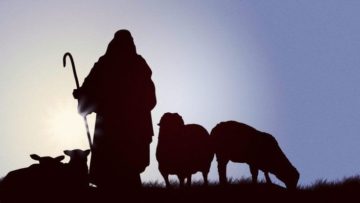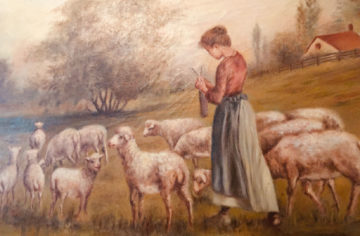While appreciating all vocations, the Church concentrates its attention this coming Good Shepherd Sunday on calls to the ordained ministries (priesthood and diaconate), consecrated life in all its forms (male and female religious life, societies of apostolic life, consecrated virginity), secular institutes in their diversity of services and membership, and to the missionary life. Fr. Paul Gallagher, OFM offers here a Scriptural Reflection on Sunday’s gospel reading. This content is edited by Franciscan Sister of Christian Charity Sister Anne Marie Lom and Joe Thiel. The excerpts from the Sunday readings are prepared by Joe Thiel. To read or download the complete pdf with excerpts for your prayer, please click here Franciscan Gospel Reflection April 25 2021. Excerpts are from the Lectionary for Mass for Use in the Dioceses of the United States of America, second typical edition © 2001, 1998, 1997, 1986, 1970 Confraternity of Christian Doctrine, Inc., Washington, DC. Used with permission. All rights reserved. No portion of this text may be reproduced by any means without permission in writing from the copyright owner.
John 10:11-18
I am the good shepherd. A good shepherd lays down his life for the sheep. A hired man, who is not a shepherd and whose sheep are not his own, sees a wolf coming and leaves the sheep and runs away, and the wolf catches and scatters them. This is because he works for pay and has no concern for the sheep.
I am the good shepherd, and I know mine and mine know me, just as the Father knows me and I know the Father; and I will lay down my life for the sheep. I have other sheep that do not belong to this fold. These also I must lead, and they will hear my voice, and there will be one flock, one shepherd. This is why the Father loves me, because I lay down my life in order to take it up again. No one takes it from me, but I lay it down on my own. I have power to lay it down, and power to take it up again. This command I have received from my Father.”
Background:
The second Sunday after Easter was traditionally Good Shepherd Sunday. Now, on the fourth Sunday of Easter in A, B, and C cycles, the gospel is taken from the tenth chapter of John’s gospel, known as the Good Shepherd Discourse. The Jewish Christian community in Jesus’ time would have been familiar with sheep and shepherds, as part of the fabric of daily life and in their religious tradition. For example, Psalm 23 and the prophecies of Ezekiel both incorporate these two images.
The gospel text for today is composed of two statements, each of which begins with the sentence: “I am the good shepherd.” In the first statement, Jesus portrays himself as a shepherd who takes his commitment to care for his sheep so seriously that he is willing to put down his own life for them. Shepherds of the day were viewed as people who lacked moral responsibility, like the shepherd who abandons the sheep at the first sight of danger. The contrast of Jesus as a good shepherd would draw the attention of those who are listening.
Jesus’ second statement uses the image of the shepherd to describe the relationship of God to the world in and through the second person of the Trinity. Jesus’ willingness to lay down his life is central to his relationship to the Father and, through him, to others. Therefore, the shepherd is described as having a special and intimate relationship with God, which is extended, through him, to the sheep and beyond. His shepherding reaches beyond his fold to those that belong to other folds. These others also recognize his voice and follow him, becoming part of the “one fold.” He does not do this on his own, but because he is faithful to the will of the Father.
Reflection Questions:
- If you were to characterize your relationship with God in terms of an animal, would it be a sheep, or some other animal? If it were some other, which would you chose?
- Having just experienced a year of world pandemic, you might be more aware of people who put their own safety at risk for others. Who would you include in that group? How many do you know personally?
- Would it be easier for you to live your life taking on possible personal bodily harm, or giving of yourself to a daily life of putting yourself out for people you do not know and who live in distant parts of the world?
- Have you ever been in a situation where you put your well-being or reputation at risk to respond to the needs of another?
- Who do you think Jesus was talking about when he said that he has other sheep not of this fold?
- In the second portion of this gospel Jesus talks about his relationship to the Father and to the flock. What qualities of that relationship stand out to you?
- Can you take time to talk to God about your response to those qualities of God’s relationship to you, the image of Jesus as a good shepherd, or some other thought that arose in you as you prayed with this text?



